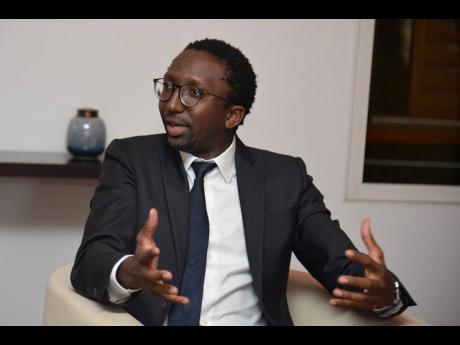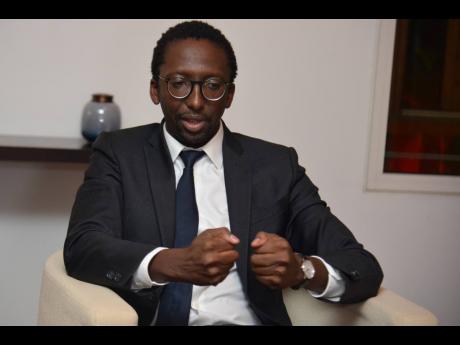From Rwanda to France to the world
Rescued from orphanage during genocide, Hervé Berville is France’s minister of the sea
Hervé Berville is a 33-year-old Tutsi survivor of the Rwandan genocide.
Exuding passion and confidence, he is French President Emmanuel Macron’s representative to the International Seabed Authority conference in Kingston.
The published author delivered a lecture at the Caribbean Maritime University (CMU) and met with Jamaican government officials during his trip to the island.
“I am the first minister in more than 30 years to visit Jamaica. The last time a French minister visited Jamaica, I was not even born,” he said in an interview with The Sunday Gleaner at the French Embassy in St Andrew last week.
An economist and a member of the French National Assembly, Berville has been serving as secretary of state to the prime minister, in charge of the sea, since July 4, 2022. Between 2017 and 2022, he was a member of parliament representing the department of Côtes-d’Armor in Brittany.
Berville has a passion for the sea and what happens in the wide expanse of water that is as beautiful and as temperamental as it is dangerous.
When Berville was four years old, he was rescued from a Rwandan orphanage by French soldiers in the second week of the bloody 1994 massacre in which a million lives were lost. The hand of fate would take him to Brittany – a hilly peninsula in the northwesternmost part of France, which extends into the Atlantic Ocean – where he was adopted by a working-class French couple.
That upbringing in that locale would cement his passion for the sea.
A new lease on life in France presented myriad opportunities for the now-accomplished young man, who still has surviving relatives, including his grandmother and sister, in his East African homeland.
His life would come full circle when, in April 2020, Macron sent Berville to Kigali, Rwanda’s capital, to represent the French government at official ceremonies to mark the 25th anniversary of the Rwandan genocide.
A 2016 graduate from the London School of Economics and Political Science with a Master of Science in Political Economics, he later became head of the Institute for Innovation at Stanford University in Nairobi, Kenya.
“I guess it’s like millions of people who were born somewhere, and grew up in another part of the world, and are fully embracing the two cultures, the two countries, and it’s an intimate and close relationship with Rwanda, even if I don’t have Rwandan nationality,” he reflected.
Rwanda, Berville said, is “intimately related to my identity”.
He added: “Half of my family was not as lucky as my brother and I.”
Nevertheless, the minister believes that the Rwandan genocide and its turnaround since 1994 is a lesson for the world.
“First of all, we need an international community to make sure that when there is this atrocity, we can act collectively, and second of all, it’s something that we can see, rising in our society, populism, extremism, putting people in a box because of the colour of their skin, because of their ethnicity, religion, it can lead to the worst of what you could imagine,” said Berville.
“That’s why I am also in politics because I am deeply convinced that we can have better societies. But touching on the good feeling of people and what I like about Jamaica – I met four amazing ministers. Of course, we talking about challenges, but always on the political, always with an approach that we have challenges but we are going to overcome them together,” he shared.
“That’s what I like about the energy here in Jamaica,” he said.
He noted that Rwanda stands as a shining example of how a society can overcome the worst atrocities, putting on full display the capacity of a people to be resilient and to recover.
However, he believes the international community failed the African nation during the ethnic cleansing.
“Yes. Of course, the international community failed. ... The international community[also] failed in other genocides. Also, we failed collectively for lack of courage, sometimes because we are blinded by lies. But, it was also the international community who helped this country’s recovery, through the French soldiers who saved my life,” he said. “You know, it’s not black and white. Sometimes you have institutions and organisation that are not able to act as quickly and as boldly as they should, but there is always a second chance.”
It is why the world needs a better functioning international organisation, and why France is taking a lead role, said Berville.
He noted that the new financial summit held in Paris a month ago was to make sure that the right level of support is given to developing countries to tackle climate change and global crises, from which countries like Jamaica will benefit.
CHALLENGES ON LAND AND AT SEA
Stating that the greatest challenge of our time is maintaining peace and citing Haiti as an example of unrest, Berville said that another great challenge is climate change, with a focus on the marine environment.
He noted that there was a long history of cooperation for peace and economic development between France and the Caribbean. France has two territories in the Caribbean – Martinique and Guadeloupe.
The Montego Bay Convention on the Law of the Sea was signed by UN countries in 1982 and came into force 16 years later with the aim of protecting and ensuring sustainable use of the resources of the sea.
“We cannot ignore any more the consequences of the climate change. We cannot ignore the fact that there is an increasing and accelerating loss of biodiversity. So the question that Caribbean [countries] are asking developing countries is: How are we going to make sure that, first of all, there is a kind of reparation for the damage you have done on the planet and that you have done to our country based on all the activity you have over the last 50 years?’,” he said.
“And the question that we have to ask, collectively – that’s why I am here – is how to make sure that we do not start an activity that will have irreparable and irreversible consequences on the deep sea and on the ocean. It is based on the harsh reality that climate change is here and we need to tackle it and make it a priority,” said Berville.
This is why, the minister said, France is supporting a sustainable economic development plan and is seeking to invest more in Jamaica in that regard. Citing investments at the port with CMA CGM and “modernising the water”, he said that France also wants more Jamaican investments there.
Inspired by what Jamaica is doing, he said that a maritime university in France signed a memorandum of understanding with the CMU. Among the reasons for this interest, he said, was the training provided for digitisation and automation, as well as the way “gender equality” was approached at the CMU.
With Caribbean countries drowning under the weight of plastic pollution, Berville said that as France prepares to host the United Nations Oceans Conference in 2025, one way to tackle to problems is to produce less plastic. France is currently working with countries to eliminate single-use plastics. Noting that there is no border in the ocean, he said, if single-use plastics are banned in Jamaica, they should also be banned in Guadeloupe.
But the issue, the minister said, is complex.
“We have plastics everywhere, even if we sometimes want to get rid of them (coastal clean-up). But it’s a work in progress,” he stated.
After 15 years of negotiations, the Biodiversity Beyond National Jurisdiction Treaty was signed last year. It calls for regulation of the high seas with an agreement on the conservation and sustainable use of marine biological diversity in areas beyond national jurisdiction.
President Macron says that this is his priority.
There is also agreement to protect 30 per cent of the world’s waters, seas and ocean.
France has banned mining its waters, and is also not mining in the high seas, Berville said.
He wants to see greater and more tangible regulation, as well as more investment in science and biodiversity.
He has been given a budget of €350 million to accelerate research for exploration and knowledge on the deep sea.
“We need to know much better those places, those ecosystems, because they can be – and I am pretty sure they are – vital for the whole balance of the planet,” he added, expressing fear that some human actions may cause irreversible damage with sometimes unclear consequences.
Berville said he would not see the deep-sea mining discussions of the last 15 years continue into the next four decades.
“That’s why we need to make sure that we have regulation, more science, and, of course, hear the voice of everybody, and work together to put a collective action, and making sure we work for the next generation,” he stated.


